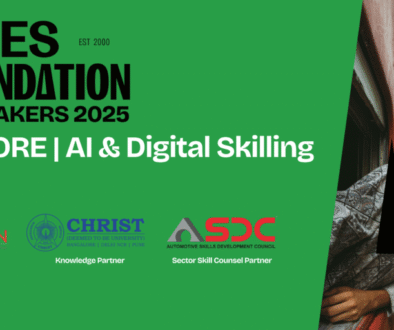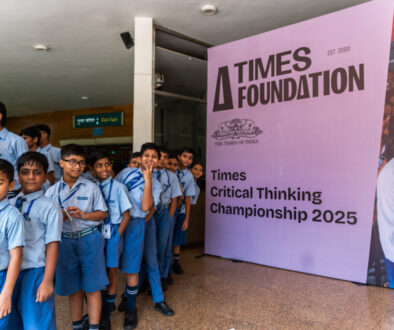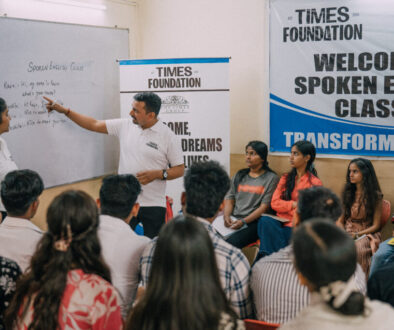Spotlight Series: Meet Melody

Your work sits at the intersection of purpose and impact. What inspired you to take on the role of leading the Times Foundation—and as an American, why did you choose India as your country of impact?
Six years ago, I arrived in Delhi for the first time. It felt less like a first trip and more like a return. I was moved by the country’s energy, its rich culture, and above all, the kindness, depth, and resilience of its people. One morning, I visited a small temple near my office—the sound of the bell, the scent of incense, and the rhythm of the mantra quickly became part of my daily rhythm. Outside, a group of children were playing. When they spotted me, they called out, “Didi! Didi!” From then on, I began bringing books, puzzles, and notebooks. We would sit together in those early morning hours, unknowingly laying the foundation for what would soon become the heart of my dreams.
That early connection still fuels me today. My journey has always been guided by a deep calling to serve—especially at the intersection of potential and equity. India holds a unique place in my heart: it’s a country of contrasts and possibilities, of ancient wisdom and youthful ambition. I chose India because I believe its future is not only vital for its own people, but also for the world. And when the opportunity to lead the Times Foundation emerged, it felt like the perfect alignment of purpose, skills, and vision.
To be able to channel those early sparks of inspiration into systemic, scalable change—through programs that empower young people to communicate, think critically, and thrive—is both a privilege and a responsibility I carry with deep humility.
The Times Foundation is rooted in the belief that empowered young people can transform society. How do you see this vision playing out in real time?
Every week, I see young people who are hungry to contribute—not just to their own growth, but to their communities and the world around them. From students who are learning to question, imagine, and build, to jobseekers who are stepping into their first real opportunities, we’re witnessing a quiet revolution. The ripple effects of investing in young minds are tangible—families lifted, communities activated, dreams set in motion. It reaffirms our belief that the future is not something we inherit—it’s something we co-create.
What does the symbol of Delta—change and transformation—mean to you personally, and how does it guide the Foundation’s work?
Delta, to me, represents the space between what is and what could be. It’s the courage to imagine beyond the status quo and the discipline to make change real. Personally, it reminds me to keep evolving – always learning, always listening. At the Foundation, it’s our North Star. Delta reminds us to be bold, and to believe that transformation is not just necessary, but inevitable when we act with vision and conviction.
The Foundation has launched initiatives like Think!Jobs Think!Critically. What impact have you seen so far, and what excites you most about what’s ahead?
We’re seeing powerful early signs. Our Think!Critically curriculum is in pilot, and students are already showing increased confidence, curiosity, and clarity of thought. This year, we’re launching the pilot of the Times Critical Thinking Champions with a cohort of schools who will drive this work forward in their schools and communities.
Meanwhile, Think!Jobs has expanded to over 250 centers across Delhi and is now rolling out pan-India with strong support from our corporate partners. What excites me most is the growing momentum – watching young people gain the skills, confidence, and voice they need to step into meaningful jobs and brighter futures.
As a leader, how do you balance strategy and heart in your decision-making? What values do you return to when things get tough?
For me, the best strategy is one rooted in deep listening and moral clarity. I return to three core values: dignity, trust, and courage.
Dignity reminds me to see the humanity in every stakeholder—from the CEO to the frontline youth. Trust asks me to lead with integrity, even when outcomes are uncertain. And courage helps me make the hard calls – to challenge inertia, to hold boundaries, to move forward even when the path isn’t clear. Strategy gives us the map, but heart keeps us honest about why we’re on the journey.
You often speak about systems that uplift and evolve. In your view, what does it truly take to build systems that are inclusive and sustainable?
It takes humility and imagination. Humility to acknowledge the limitations of existing systems, and of our own perspectives. Imagination to envision new structures that center equity, joy, and resilience. Practically, it means co-designing with communities, embedding feedback loops, and investing in long-term capacity over short-term optics. It also requires bridging silos—between government, civil society, and business because no one sector can solve systemic challenges alone. Inclusion and sustainability aren’t just design principles; they’re daily practices that require ongoing attention, alignment, and care.
Who are some of the young people or communities that have left a lasting impression on you through your work at the Foundation?
It’s rarely just one person or moment, it’s the quiet accumulation of voices, questions, and sparks that leave the deepest imprint. What stays with me is not a single story, but the pattern that emerges when young people are truly seen, challenged, and trusted. A shift in posture. A new kind of confidence. A readiness not just to answer, but to ask better questions.
Across classrooms and job centers, urban and rural settings, I’ve seen how potential lights up when given space. Communities often carry a quiet brilliance that doesn’t announce itself but when invited in, it transforms the work. It teaches you to lead not with certainty, but with openness.
The impression they leave isn’t just emotional, it’s structural. It shapes how we design programs, how we define success, and how we remember that the best solutions are co-created. What lasts isn’t just their progress. It’s their presence. And the way it continues to inform everything we do.
What’s one shift in thinking that you believe could unlock massive change for India’s youth today?
That their worth is not determined by marks, degrees, or proximity to power. The real unlock is: You are not here to fit in—you are here to shape what’s next. When young people begin to see themselves not as products of a system, but as designers of it, everything changes. Innovation, courage, and collective progress become possible.
What do you believe is the most urgent shift young people in India need to make—in how they see themselves or the world?
They need to stop seeing themselves as future leaders—and recognize that they are leaders, right now. Leadership isn’t a title or a milestone; it’s a mindset. The most urgent shift is from passive ambition to active ownership. The world isn’t waiting for them to be older, more qualified, or more polished. It’s waiting for them to show up as they are.
What inner quality or value do you think will define the most impactful changemakers of the future?
Discernment. In a world flooded with noise, opinions, and urgency, the changemakers who will lead with clarity are those who can pause, reflect, and choose wisely. Discernment allows for both speed and stillness. It’s the quiet strength behind bold decisions. Coupled with empathy and vision, it will define a new kind of power—one that uplifts rather than dominates.


